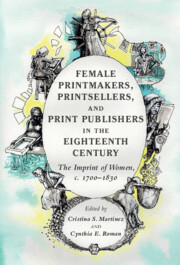120 results
6 - Kings and Merchants
- from Part III - The Spanish Case Studies
-
- Book:
- Balancing Strategy
- Published online:
- 25 April 2024
- Print publication:
- 02 May 2024, pp 129-148
-
- Chapter
- Export citation
1 - Plural Beginnings
-
- Book:
- Sharing Freedom
- Published online:
- 28 March 2024
- Print publication:
- 04 April 2024, pp 31-74
-
- Chapter
- Export citation
Chapter 2 - Maria Hadfield Cosway’s ‘Genius’ for Print
- from Part I - Self-Presentation and Self-Promotion
-
-
- Book:
- Female Printmakers, Printsellers, and Print Publishers in the Eighteenth Century
- Published online:
- 14 March 2024
- Print publication:
- 21 March 2024, pp 25-39
-
- Chapter
- Export citation

Female Printmakers, Printsellers, and Print Publishers in the Eighteenth Century
- The Imprint of Women, c. 1700–1830
-
- Published online:
- 14 March 2024
- Print publication:
- 21 March 2024
2 - Production, 1000–1500
- from Section II - The Medieval Economy, 1000–1500
-
-
- Book:
- An Economic History of the Iberian Peninsula, 700–2000
- Published online:
- 22 February 2024
- Print publication:
- 29 February 2024, pp 47-75
-
- Chapter
- Export citation
8 - International Trade and Commerce, 1000–1500
- from Section II - The Medieval Economy, 1000–1500
-
-
- Book:
- An Economic History of the Iberian Peninsula, 700–2000
- Published online:
- 22 February 2024
- Print publication:
- 29 February 2024, pp 199-220
-
- Chapter
- Export citation
Chapter 6 - Credit and Credulity
-
- Book:
- Mary Wollstonecraft and Political Economy
- Published online:
- 15 February 2024
- Print publication:
- 22 February 2024, pp 185-214
-
- Chapter
- Export citation
27 - Legal Pluralism and Commerce
- from Part III - Central Themes in Comparative Law
-
-
- Book:
- The Cambridge Handbook of Comparative Law
- Published online:
- 26 January 2024
- Print publication:
- 01 February 2024, pp 544-558
-
- Chapter
- Export citation
4 - Trade and commerce power
- from Part 2 - Legislative powers
-
- Book:
- Australian Constitutional Law
- Published online:
- 14 December 2023
- Print publication:
- 04 January 2024, pp 96-113
-
- Chapter
- Export citation
2 - The Great Tradition That Failed
-
- Book:
- The Tortuous Path of South Korean Economic Development
- Published online:
- 07 December 2023
- Print publication:
- 21 December 2023, pp 21-47
-
- Chapter
- Export citation
Commercial Casualties: Political Boycotts and International Disputes
-
- Journal:
- Journal of East Asian Studies / Volume 23 / Issue 3 / November 2023
- Published online by Cambridge University Press:
- 23 October 2023, pp. 387-410
- Print publication:
- November 2023
-
- Article
-
- You have access
- Open access
- HTML
- Export citation
Adam Smith and Sociology
-
- Journal:
- European Journal of Sociology / Archives Européennes de Sociologie / Volume 64 / Issue 3 / December 2023
- Published online by Cambridge University Press:
- 19 October 2023, pp. 303-324
-
- Article
-
- You have access
- Open access
- HTML
- Export citation
2 - The Alley of the Ram
-
- Book:
- The Ottoman Ibadis of Cairo
- Published online:
- 21 September 2023
- Print publication:
- 05 October 2023, pp 53-76
-
- Chapter
- Export citation
4 - Talking to My Butcher
-
-
- Book:
- Interpreting Adam Smith
- Published online:
- 14 September 2023
- Print publication:
- 28 September 2023, pp 62-76
-
- Chapter
- Export citation
8 - A Moral Philosophy for Commercial Society?
-
-
- Book:
- Interpreting Adam Smith
- Published online:
- 14 September 2023
- Print publication:
- 28 September 2023, pp 124-141
-
- Chapter
- Export citation
6 - Adam Smith and Virtuous Business
-
-
- Book:
- Interpreting Adam Smith
- Published online:
- 14 September 2023
- Print publication:
- 28 September 2023, pp 96-110
-
- Chapter
- Export citation
6 - Montesquieu and Machiavelli
- from Part II - Machiavelli’s Fortuna
-
- Book:
- Machiavelli's Effectual Truth
- Published online:
- 07 September 2023
- Print publication:
- 21 September 2023, pp 149-246
-
- Chapter
- Export citation
8 - When the Endogenous Becomes Exogenous
-
- Book:
- Shocking Contrasts
- Published online:
- 09 June 2023
- Print publication:
- 17 August 2023, pp 187-207
-
- Chapter
- Export citation
Trade, literacy and documentary histories of the northern Black Sea
-
- Journal:
- The Journal of Hellenic Studies / Volume 143 / November 2023
- Published online by Cambridge University Press:
- 09 August 2023, pp. 1-23
- Print publication:
- November 2023
-
- Article
-
- You have access
- Open access
- HTML
- Export citation
5 - Cities and Urban Life
-
- Book:
- Middle Imperial China, 900–1350
- Published online:
- 20 July 2023
- Print publication:
- 03 August 2023, pp 120-142
-
- Chapter
- Export citation



